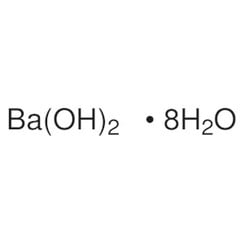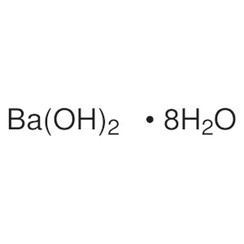You have no items in your shopping cart
Barium hydroxide
Barium hydroxide is a chemical compound with the chemical formula Ba(OH)2(H2O)x. The monohydrate (x =1), known as baryta or baryta-water, is one of the principal compounds of barium. This white granular monohydrate is the usual commercial form.
Industrially, barium hydroxide is used as the precursor to other barium compounds. The monohydrate is used to dehydrate and remove sulfate from various products. This application exploits the very low solubility of barium sulfate. This industrial application is also applied to laboratory uses.
Laboratory uses
Barium hydroxide is used in analytical chemistry for the titration of weak acids, particularly organic acids. Its clear aqueous solution is guaranteed to be free of carbonate, unlike those of sodium hydroxide and potassium hydroxide, as barium carbonate is insoluble in water. This allows the use of indicators such as phenolphthalein or thymolphthalein (with alkaline colour changes) without the risk of titration errors due to the presence of carbonate ions, which are much less basic.
Barium hydroxide is occasionally used in organic synthesis as a strong base, for example for the hydrolysis of esters and nitriles, and as a base in aldol condensations.
It has been used to hydrolyse one of the two equivalent ester groups in dimethyl hendecanedioate.
Barium hydroxide is used, as well, in the decarboxylation of amino acids liberating barium carbonate in the process.
It is also used in the preparation of cyclopentanone, diacetone alcohol and D-Gulonic γ-lactone.


